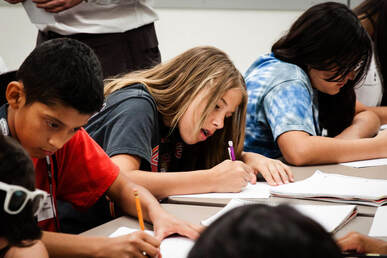 Photo by Bruce Matsunaga Photo by Bruce Matsunaga by Caitlin Hertzberg As early as I can remember, I’ve always been a writer. I’d always been gifted diaries throughout my childhood, swirling gel pen tips to doodle hearts in the margins near the names of boys I crushed on, spilling the ink of my secrets onto lavender-scented paper. I would steal phrases from overheard conversations and work them into melodies that tortured me from inside my head (I still do this). One of my earliest memories of being a writer is from 4th grade, ripping out sheets from a 99-cent spiral notebook and begging my grandmother to “staple it good” down the middle so that I can write stories like Judy Blume and Jerry Spinelli. Notice I make no mention of writing in school: The kind of writing with strict sentence and paragraph minimums, about topics I couldn’t care about no matter how hard I tried. The kind of writing that you work on for weeks on end in the overheated computer lab, revising, revising, revising, memorizing the teacher-provided rubric until every word of your assignment sounds like an owner’s manual for a VCR. As a teacher, I do my best to keep these depressing writing experiences at the forefront of my mind and try my hardest not to inflict the same pain onto my middle schoolers. I often hear parents panic about how their child doesn’t know how to sign their name. Their child can’t spell some of the most important words and doesn't know the difference between “then” and “than.” And listen, I get it. I, too, feel a sense of loss at the gradual extinction of what most of us were taught to think of as “writing skills.” But, from where I can see, we have bigger fish to fry.  Photo by Andrea De Santis on Unsplash Photo by Andrea De Santis on Unsplash Since Gen Z was born into a world of technology, “text language” has turned into just “language.” I can deal with that. Language is ever-evolving. I know this, we all know this. But because the world keeps changing, writing education is forever playing catch-up. Technological advancement has given us so many tools we can use to perfect our written communication: spell checks, grammar checks, even bots that will write an entire, flawlessly written essay for you. In fact, many corners of the workforce are already using bot-written content as a way to save time, and in turn, save money. And with every new text created from code, AI gets better, and the value of the writer diminishes a little bit more. I know it hurts to hear this, and it kills me to say it, but it seems to me that maybe we should stop focusing on writing as a promising career choice. Academic writing, content writing, journalism, and even creative writing are at risk of being taken over by bots. While artificial intelligence isn’t completely up to snuff right now, content created by programs like Copy.AI and Jasper are getting less distinguishable from human-created work every day. Even though there is a need for competent writers to edit the work produced by AI, I think it’s clear that the need for writers on payroll is going to decline because of the speed at which AI can spit out words that kind of make sense. Most writing curriculum now, Kindergarten through 12th grade, only adds up to five paragraph college essays and high school level open-ended responses. Artificial intelligence can do this pretty well, and students are already taking advantage of that. So, what are we to do about this? Even as someone who loves to write, teaching writing feels like a constant losing battle. I don’t know the answer, or have the cure, if there even is one. But I’ve seen a whole lot of approaches that don’t work:
Currently, the writing instruction prescribed to middle school students is heavily reliant on formulaic writing that follows a template in order to achieve the highest score on a rigid rubric designed to pump out as many cookie-cutter constructed responses as possible. Now, I’m not entirely against teaching students this way. The expectations are clear, and students do need to be taught how to clearly express their ideas through writing. However, without supplementing the curriculum as it is, this is the only kind of writing my middle schoolers would be exposed to for an entire year of their education. And as I recall the writing education I received, it hasn’t changed much. Maybe artificial intelligence will be the catalyst we need in order to bring the importance of the writer and the art of writing to the forefront of education. Why teach writing if AI is eventually going to get the job done?  Photo by Annie Spratt on Unsplash Photo by Annie Spratt on Unsplash As educators, we are always concerned with the why. The “why” is what makes lessons meaningful, applicable, and relevant to students’ lives. With AI soon overtaking the capitalistic reasons for writing, the why in all of writing education would simply be to practice using your voice to make your corner of the world a little bit better, because every person is capable of that. Every child deserves to know and understand and practice that. We must revitalize writing as an art in education. The imagery, metaphors, and love letters. The essays that breathe the fire of an author’s breath. Because this kind of writing, connecting to the world and to each other, is a need that will always be in demand. Artificial intelligence cannot feel, cannot connect with the world in a human way. The education universe must recognize that writing is at risk of dying if we don’t align writing curriculum with what the future of most writing will be: bot-dominated. If we can shift our sights away from what we have believed are the writing needs of a capitalist society and face the truth of the matter, maybe, just maybe, the art of writing will survive.
0 Comments
Leave a Reply. |
Archives
July 2024
Categories
All
|
|
Glassworks is a publication of Rowan University's Master of Arts in Writing 260 Victoria Street • Glassboro, New Jersey 08028 [email protected] |
All Content on this Site (c) 2024 Glassworks
|

 RSS Feed
RSS Feed
